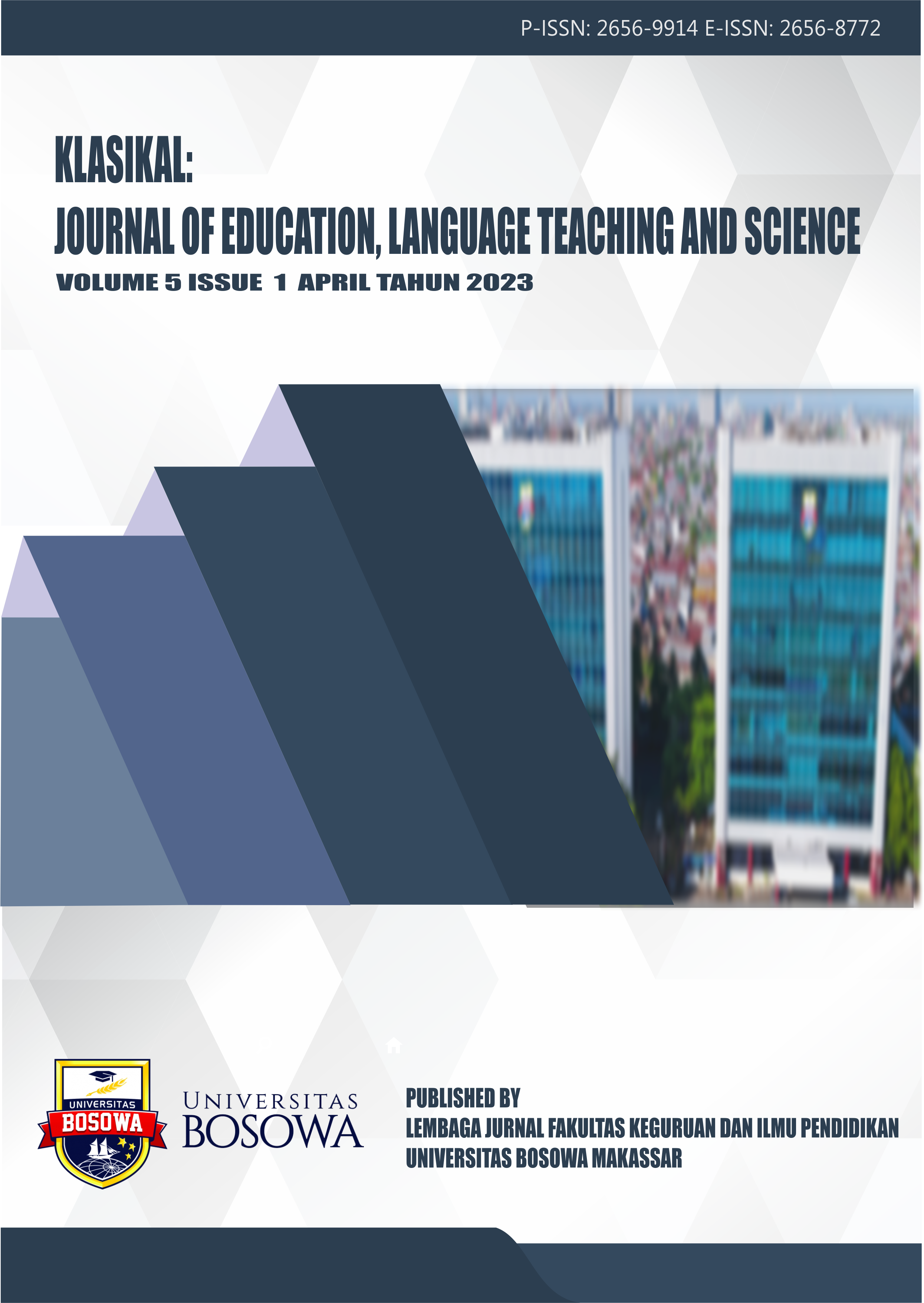RESEARCHING LEARNING STRATEGY TRAINING IN ENGLISH CAMPS: ACTS AND FACTS
DOI:
https://doi.org/10.52208/klasikal.v5i1.626Keywords:
Learning strategy, speaking skills, affective and cognitive, motivation, learning styleAbstract
As English grows as a foreign language in Indonesia, which is rarely used daily, learning strategy training might be one innovation to help students acquire the target language quickly. This study aimed to research the implementation of learning strategy training in English camps and understand the effect of the training on the student’s ability to solve their learning problems, especially in speaking English. It was a qualitative design with a case study approach. This research was conducted in the English village of Kampung Inggris Pare. It limited the investigation of learning strategy training in English boardings or camps. Four participants consisting of three students and one instructor were selected purposely. The data were gathered by conducting direct observations, interviews, and photos. They were then analyzed in six steps starting from preparing raw data materials to interpreting the meaning of the theme into qualitative descriptions. The results show that the instructor trained two domains of students' soft skills: affective and cognitive. From the affective side, the instructor encouraged students' motivation to stay enthusiastic, not hesitate to speak, and are not scared of making mistakes. While from the cognitive side, the instructor trained students to learn English through their hobby or passion, such as through a song or movie for those who love music or watching. In fact, students could find and develop their own learning strategies based on their learning style and "let it flow" without paying more attention of grammar errors. Therefore, this study suggested teachers or instructors approach the students emotionally and train them to learn English with appropriate strategies based on their learning style or passion.
References
Ahsanu, M., Februansyah, R., Handoyo, R. P. (2014). English Basecamp: An Alternative Learning Method for Enhancing Speaking Skill (A Case Study in Kampung Inggris, Pare, Kediri, East Java). International Integration for Regional Management. 383-386.
Al Hosni, S. (2014). Speaking difficulties encountered by young EFL learners. International Journal on Studies in English Language and Literature (IJSELL), 2(6), 22-30.
Benson, S., Fischer, D., Geluso, J., & Von Joo, L. (2013). Effects of communication strategy training on EFL students’ performance in small-group discussions. Studies in Second Language Learning and Teaching, 3(2), 245-259.
Chamot, A., U. (2004) Issues in Language Learning Strategy Research and Teaching. Electronic Journal of Foreign Language Teaching, 1(1), 14-26.
Creswell, J. W. (2014). Research Design: Qualitative, Quantitative, And Mixed Methods Approaches (4th ed.). United Kingdom: Sage Publications.
Fauziati, E. (2015). Teaching English as a Foreign Language: Principle and Practice. Surakarta: Era Pustaka utama.
Haryanto. (1998). Motivasi dan Strategi Belajar pada Pembelajaran Bahasa Inggris yang berhasil di SMU. (Unpublished Thesis, Institut Keguruan dan Ilmu Pendidikan Jakarta).
Lee, C. K. (2010). An Overview of Language Learning Strategies. Annual Review of Education, Communication & Language Sciences, Vol.7, 132-152.
Marlin, Saehu, A., & Yundayani, A. (2021). Investigating Students’ Language Learning Strategies During Online Learning: How They Deal with Speaking Ability. JEELS (Journal of English Education and Linguistics Studies), 8(2), 229-261.
Mufidah, N. (2014). Learning Strategies On English Acquisition Of Junior High School Students Of Darul Hijrah Islamic Boarding School Martapura, South Kalimantan. The Multifaceted Dimensions of English Linguistics, Literature and Education, (Proceedings of International Conferenceon the 2nd English Linguistics, Literature and Education (ELITE), 207-222
Oxford, R.L. (1990). Language Learning Strategies: What Every Teacher Should Know. Boston: Heinle & Heinle.
Oxford, R. L. (2003). Language Learning Styles and Strategies: an Overview. GALA., 1-25.
Pratiwi, W. R., Atmowardoyo, H., & Salija, K. (2020). The Need Analysis of Participation in an English Immersion Village at" Kampung Inggris Pare". International Journal of Language Education, 4(1), 158-170.
Pratiwi, W. R., Suardi, S., & Acvfira, L. G. (2021). The Effectiveness of “Neuro-Cognitive” Learning Strategy for Increasing Speaking Performance: Study on Non-English Department Students. Klasikal: Journal Of Education, Language Teaching And Science, 3(3), 14-26.
Razmjoo, S. A., & Ardekani, S. G. (2011). A Model of Speaking Strategies for EFL Learners. The Journal of Teaching Language Skills (JTLS), 3(3), 115-142.
Sarafianou, A., & Gavriilidou, Z. (2015). The Effect of Strategy-Based Instruction on Strategy Use by Upper-Secondary Greek Students of EFL. Electronic journal of foreign language teaching, 12(1).
Setiyadi, A. B., & Sukirlan, M. (2016). How Successful Learners Employ Learning Strategies in an EFL Setting in the Indonesian Context. English Language Teaching, 9(8), 28-38.
Suardi, S., & PRATIWI, W. R. (2022). Remain Productive in Covid-19 Pandemic: Promoting Whatsapp Group-Based English School. Lentera Pendidikan: Jurnal Ilmu Tarbiyah dan Keguruan, 25(1), 103-116.
Sugiarto, D., Mega, I. R., & Sugiarto, D. (2020). Speaking Skills in Correlation with English Speaking Learning Habit and Self Confidence of Vocational High School Students. Journal of Foreign Language Teaching and Learning, 5(2).
Weda, S., Samad, I. A., Patak, A. A., & Fitriani, S. S. (2018). The Effects of Self-Efficacy Belief, Motivation, and Learning Strategies on Students’ Academic Performance in English in Higher Education. The Asian EFL Journal Quarterly, 20(9.2), 140-168.

Downloads
Published
How to Cite
Issue
Section
License
Copyright (c) 2023 Widya Rizky Pratiwi

This work is licensed under a Creative Commons Attribution 4.0 International License.

Klasikal: Journal of Education, Language Teaching and Science is licensed under a Creative Commons Attribution 4.0 International License.



















